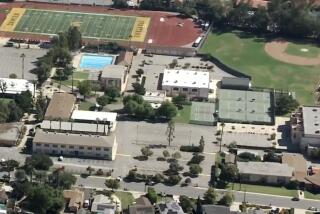Radiation Rumors Alarm West Europe
- Share via
BONN — A nuclear accident scare swept Western Europe on Wednesday, temporarily driving up the relative value of the dollar, putting radiation monitoring stations on the alert in Sweden and bringing a prompt denial from the Soviet Union.
Alarm bells began ringing in newsrooms and government offices across the Continent on the heels of a report suggesting that something akin to the Chernobyl disaster had occurred again in the Soviet Union.
In April, 1986, a reactor at the Chernobyl power plant in the Ukraine exploded and burned, sending radioactive material across a vast area.
‘Completely Groundless’
Moscow quickly denied that there had been a new nuclear accident. Alexei Cherkashin, a spokesman for the Foreign Ministry, said: “Nothing of this kind happened today on the territory of the Soviet Union. We can say these rumors are completely groundless.”
As it developed, they were just that. The false alarm was widely attributed to a test message sent out by the International Atomic Energy Agency, a U.N. organization headquartered in Vienna.
IAEA officials denied that such a test message had been transmitted Wednesday, but they said that one had gone out Jan. 27, in connection with the establishment of a worldwide nuclear alert system. They said it had been sent through the World Meteorological Organization, another U.N. agency in Geneva.
That agency maintains a 160-nation weather watch, and this network has been chosen by the IAEA as potentially best suited for a round-the-world alert in case of nuclear disaster.
James Daglish, a spokesman for the IAEA, said: “We have not sent any message referring to a nuclear accident, even in code. We have been using test telexes to show the ability to communicate. We have to test the systems we would have to use in the event of a real accident.
“We sent out a test message clearly identified as such and merely asking acknowledgement for receipt of message. Our telex did not say ‘Soviet Union’ and did not say ‘nuclear accident.’ ”
In Geneva, an official for the weather agency confirmed that a coded test message was sent a week ago.
“We believe it could all be a misunderstanding while a test was being run to see if our weather monitoring network could be used as an early warning and notification system in the event of a nuclear accident,” the official said.
The rumor of a nuclear accident cropped up first in the money markets of London and other European capitals, leading to an immediate rise in the value of the dollar.
Then a Swedish news agency Tidnigarnas Telegrambyra sent out a one-line bulletin: “A nuclear accident has occurred in the Soviet Union.” It gave no details and no source for its information.
Sweden’s Radiation Protection Institute then said it was investigating a rumor of a nuclear accident. Monitoring stations in Scandinavia were alerted. It was the Radiation Protection Institute that first reported the extent of the fallout from Chernobyl in 1986.
Garbled Form Possible
In Geneva, the weather agency suggested that its test message may have been received in garbled form at some point, and that this might have led to misinterpretation.
Regular procedure calls for the receiving meteorological station to decode the test transmission and report by telex to the IAEA contact in the country involved. The agency in Geneva is then advised.
The meteorological agency said the decoded reports might have led to a misunderstanding.
Leo Rannaleet, a special consultant, told the British news agency Reuters that such messages normally specify a site and provide “some information on latitude and longitude and some meteorological information.” He said that all IAEA test messages begin with the word test , in English.
More to Read
Sign up for Essential California
The most important California stories and recommendations in your inbox every morning.
You may occasionally receive promotional content from the Los Angeles Times.













